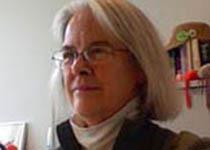
In teaching microbiology Dr. Godfrey aims to communicate the role microbes play in world affairs. She wants students to know that microbes are not just "germs", to know that several types of them are more numerous than any other life forms on the planet, that because of their metabolic diversitythey can live in places we can't and also serve us, and that without them no other life would continue for long on earth. Every student, no matter what the eventual career choice, will need to understand these things to be a responsible citizen and voter in our increasingly technological world, and to understand the action and risks of biological weapons (which are microbes).
Dr. Godfrey's fascination with microbes grew out of a love of the abstract (we can't see them directly), and, together with a compulsion to mess around in the laboratory, was fostered in her undergraduate research encounter with the classic large scale bacterial DNA purification in which DNA fibers are miraculously and visibly wound onto a U-shaped glass rod as they are precipitated from solution. Her laboratory explorations of microbes have since included:
- Study of the differentiation of fruiting bodies in the filamentous fungus Phycomyces blakesleeanus (with Dr. Sol Goodgal, Department of Microbiology, University of Pennsylvania School of Medicine)...
- ... and of the cellular slime mold Dictyostelium discoideum (with Dr. Maurice Sussman, Department of Biological Sciences, University of Pittsburgh).
- Cloning and sequencing of gyrase gene fragments from the archaea Halobacterium halobium and Sulfolobus solfataricus as well as in the eubacterial Arthrobacter spp. from deep soil core samples.
- (with Dr. Wai Mun Huang, Department of Cellular, Viral, and Molecular Biology, University of Utah Medical Center).
- A variety of bacteriophage projects in collaboration with undergraduates and with Dr. Roger Hendrix of this Department.
Oh, and there was an interlude learning the rigors of biochemistry (with Dr. Norm Curthoys, Department of Biochemistry, University of Pittsburgh School of Medicine) studying ammonia metabolism in rat kidney. Although rats are not generally considered to be microörganisms, the work was relevant as prokaryotic microbes are often considered to be bags of enzymes. Dr. Godfrey inadvertently began teaching as a student, having 4 siblings who are curious non-scientists. One thing led to another. Finding that teaching is at least as much fun as doing research, and that microörganisms are a whole lot more fun, varied, peculiar, and entertaining than rats, Dr. Godfrey has since 1980 been teaching microbiology full time in the Department, both in the laboratory and in the lecture hall, with occasional brief intervals of research, undertaken to keep her technical skills and information base up-do-date.
In connection with her teaching of bacteriophage biology, Dr. Godfrey functions as webmaster for the American Society of Microbiology pages for its Division M: Bacteriophage site, which she co-authors with Dr. Hendrix. Bacteriophage aficionados affectionately refer to this site, intended to promote and inform interest in bacteriophage among the public-at-large, as "the HomePhage".
- Susan Godfrey, Lecturer Emerita
